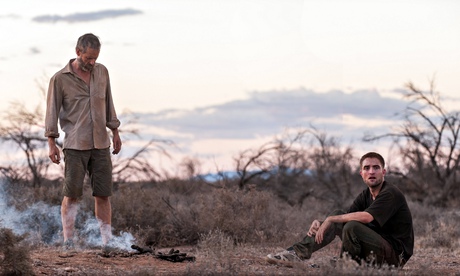
I confess I've never visited Australia. I realise this may be a massive oversight on my part, but if I ever come to regret it, it won't be because of the movies. I can think of barely a handful of films that make that country look like a charming and delightful place to live – and any number that portray it as a vast, lawless no-go zone in which people subsist in a state of crazed, feral desperation. There's the recently rereleased 1971 chiller Wake in Fright, or grisly true-crime tale Snowtown; the Mad Max trilogy, Nick Cave-scripted period drama The Proposition or, if you really want to contemplate the more irredeemable aspects of human behaviour, The Inbetweeners 2.
One of the grimmer, and certainly one of the most brilliant, Australian stories of tainted humanity is writer-director David Michôd's 2010 debut Animal Kingdom, about a Melbourne crime clan. But that film's world was almost cosy compared to that depicted in Michôd's follow-up The Rover, a bleak and extremely violent vision of earthly hell in a dystopian future.
The Rover is a desert-set drama that takes place, an opening title tells us, "10 years after the collapse". That collapse, apparently economic and global, has left society in a state of fragmentation and extreme deprivation. The protagonist is a man named Eric (Guy Pearce), first seen staring into the void across an inhospitable expanse of dust. When his car is stolen by a group of desperadoes, Eric takes off in the renegades' own abandoned vehicle, icily stares down their guns and demands his car back. And he won't rest until he gets it.
Later, pursuing his mission across the desert, he visits a house where a disturbingly calm elderly woman (Gillian Jones, in a performance that gently chills your blood) tries to pimp him her grandson. But Eric is interested in only one thing. "You must really love that car, darling," sighs the woman. "What a thing to get worked up about in this day and age."
She, it's clear, is not one to get worked up over anything and gazes calmly at Eric as if it doesn't matter whether death comes right this instant or sometime during the next sentence. That's one thing that The Rover acutely captures, a world in which death is ever-present, because everyone is only nominally alive. Eric is a prime example of the "already dead" existential hero, facing down the world with steely-souled detachment and is as ready to kill as anyone else.
The car thieves include an American named Henry (Scoot McNairy), whose brother, Rey (Robert Pattinson), becomes Eric's reluctant travelling companion. Eric, out of expediency as much as compassion, gets Rey's wounds fixed by one person still worthy of the epithet "human" – a doctor (Susan Prior) who has opted out of society to tend to stray dogs, which she keeps locked up because people keep trying to eat them. Eric also happens on a military encampment, where the commanding officer assures him that there is some sort of government still operating, but that no one should expect it to care about them.
Michôd and his collaborators, including actor Joel Edgerton, who doesn't appear but has a co-writing credit, have convincingly and comprehensively imagined a world of breakdown reeking of rust and squalor. Cinematographer Natasha Braier and production designer Jo Ford evoke a widescreen vista of aridity and fuggy light, of sand, scrub and knackered metal; the fugitives' hideout is a grey dive redolent of unwashed vests and old men's armpits. Pearce's Eric totally belongs to this world – skin mottled and leathery, hair scraggy and thinned out, face coming to life in the occasional wary flaring of his nostrils, as if he had only survived by semi-mutating into a scrubland rodent.
It's a tough, scarily understated characterisation. Alas, Robert Pattinson's confused man-boy Rey doesn't quite measure up. He fits the role physically, his big, blocky head cropped, dirt-smeared and scabbed, but he overburdens the character with ruminative "mm-hmm" mannerisms awkwardly reminiscent of Billy Bob Thornton in Sling Blade. Pattinson has proved he can go way beyond his Twilight range, notably in David Cronenberg's Cosmopolis, but he doesn't quite pull it off here.
When Eric's grim back story emerges, you realise just why he seems even more dead than everyone around him. But when Michôd adds the very final twist, it feels like a bathetic punchline to an overextended shaggy dog story.
The Rover never delivers on the promise of its first third, but that opening stretch is something, a tight-lipped, hyper-atmospheric exercise in that neo-spaghetti western style you might call "Phony Leone". Antony Partos's score features guitar that veer from grungy metallic rasp to a baleful, distant dead clang, and Sam Petty's sound design – insects, raspy motors, the death-rattle crunch of gravel – is meshed in wonderfully.
Overall, an honourable misfire for David Michôd – and another catastrophic blow for the Australian tourist board.

